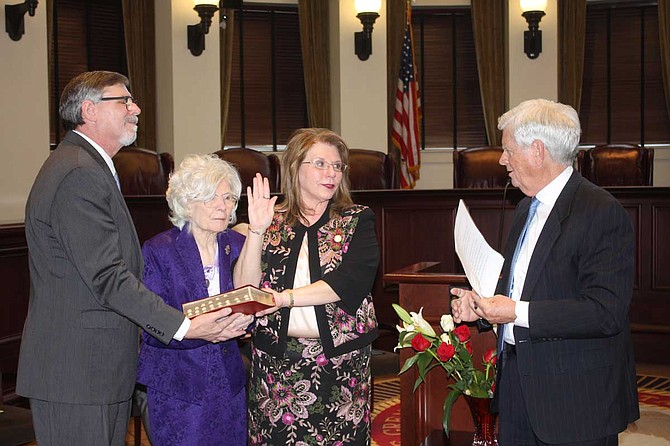Donna Barnes (center) at her swearing in ceremony. With Judge Barnes at left are her brother Paul Barnes and mother Ouida Barnes. At right is Supreme Court Chief Justice Mike Randolph, who administered the oath. Photo courtesy Mississippi Courts
The Mississippi Bar's Women in the Profession Committee honored Donna Barnes, the first female chief judge of the state Court of Appeals, as a "trailblazer among women lawyers" by presenting her with the 2019 Susie Blue Buchanan Award on July 11. The award ceremony was part of the organization's Price-Prather Luncheon at the Mississippi Bar Convention in Destin, Fla.
Susie Blue Buchanan, the award's namesake, was a Brandon native who became the first female lawyer qualified to practice in cases the Mississippi Supreme Court rules on in 1916. The Price-Prather Luncheon is named for Washington County Court Judge Zelma Wells Price of Greenville—the state's first female judge—and Lenore Loving Prather of Columbus, who was the first Mississippi female chancellor, first female justice and first chief justice of the Mississippi Supreme Court. Prather received the Susie Blue Buchanan Award in 2005.
"I consider Buchanan, Price and Prather to be the true trailblazers for women in Mississippi law rather than me, but I also understand that what I do in the position that I'm so fortunate to hold reflects on other women who come after me," Barnes told the Jackson Free Press. "You have to always work to help the next generation of young lawyers coming up after you."
Supreme Court Chief Justice Mike Randolph named Barnes as chief judge of the Court of Appeals on Feb. 1, 2019. Before taking on her current position, she was one of seven associate judges on the court who work together with the chief judge. Barnes has served on the Court of Appeals for 15 years. Former Gov. Haley Barbour appointed her to the position on July 26, 2004, to replace Judge Roger McMillan, who retired that year. She was formally elected to the position in November 2006 and re-elected in November 2010 and November 2018.
Barnes was born in Natchez and graduated from Adams County Christian School before attending the University of Mississippi, where she double majored in classical civilizations and English. She received her bachelor's degree from UM and graduated summa cum laude in 1982. She then enrolled in the University of Mississippi School of Law, where she earned her juris doctorate and graduated magna cum laude in 1985.
"I had actually never even seen the inside of a courtroom until I entered (UMSL)," Barnes says. "I became interested in becoming a lawyer when I took a business law course that a friend named Bob Bruce had already taken. When I took the course myself, it made me think I might do well in law school because of how it dealt with contracts and other business law issues. It was immensely interesting to learn how law touches everyone's lives, whether it's real estate, wills or the Constitution."
After graduating, Barnes became a lawyer with the firm of Mitchell, McNutt and Sams in Tupelo, where she had served a clerkship while attending UMSL. She remained with the firm for more than 18 years before joining the Court of Appeals.
In 1996, she took a sabbatical and traveled to England to study law at the University of Cambridge. Her studies there included international commercial litigation, comparative public law, international human rights, and the law and practice of civil liberties. She earned her Master of Law degree from Cambridge in 1997 and returned to Mitchell, McNutt and Sams that year.
Barnes is a fellow of the Mississippi Bar Foundation, a member of the Mississippi Judicial College Board of Governors and the Criminal Code Revision Consulting Group and a former member of the Judicial Advisory Study Committee.
In 2006, Barnes became an inaugural member of the Mississippi Access to Justice Commission, an organization the Mississippi Supreme court created to help Mississippi citizens have better access to the court system through services such as interpreters or free legal representation for court cases. She left the commission toward the end of 2016.
"Every judge works to do their best in each case based on their research and understanding of the law," Barnes says. "You have to apply the law even-handedly, but every judge still brings their own background and life experiences with them, and none of us think exactly the same on anything. One of the strengths of the appeals court is that every judge weighs in on every case and brings their own viewpoint we make a decision."
More stories by this author
- New CSET Atrium Dedication and College of Business Donation at JSU, MSU ERDC Day
- JSU Commencement Speakers, National Academy of Inventors Chapter and Marc E. Bassy at MSU
- JSU Getty Images Donation, MSU Research Week and Give Wing at USM
- Alumni Enrichment Institutes an MS Got Soul at JSU, State Science Fair at USM
- JSU Blue Tie Gala and Regions Card, MSU Virtual Reality Grant



Comments
Use the comment form below to begin a discussion about this content.
comments powered by Disqus